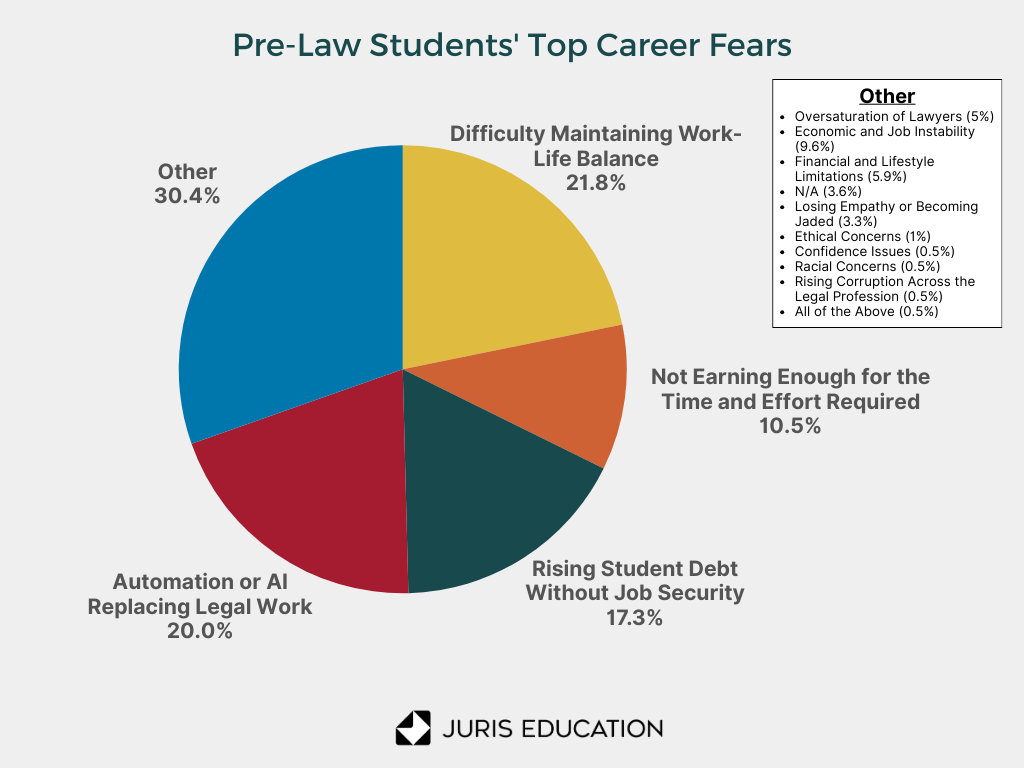Get in touch: (800) 551-3410


August 12, 2025, New York, NY (Last Updated September 10, 2025) — A new survey from Juris Education reveals that 1 in 5 aspiring lawyers fear Artificial Intelligence could replace their jobs.
A new survey of 220 pre-law students by Juris Education conducted in July 2025 reveals that 20% see AI replacing their jobs as their biggest career fear, surpassing concerns like job market instability and rising student debt.
Among all the fears listed, jobs being replaced by AI was second, behind difficulty maintaining work-life balance (21.8%).
The respondents of the survey were all pre-law students. They answered the survey anonymously through a Google Form.

Juris Education is a law school admissions consulting firm that helps students navigate the law school application process. Their team of former admissions officers and admissions experts from top law schools has over 15 years of experience.
Recent studies from the American Bar Association show that their concerns are not without reason.
In 2024, ABA reported that out of 512 respondents, 30.2% of attorneys had already incorporated AI-based technology tools in their firms. AI tool adoption was especially high at 47.8% in large firms with 500 or more lawyers.
This represents an increase from the previous year, when 10.9% of respondents reported using AI-based technology tools in their firms. That means AI usage among lawyers nearly tripled year-over-year, increasing by 177%.
Furthermore, according to the ABA Journal, entry‑level roles once dominated by law graduates are being replaced by AI tools such as Harvey that increasingly handle legal research, contract review, and document drafting.
Arush Chandna, founder of Juris Education, said that AI anxiety reflects a broader shift in the legal field.
“We’re no longer talking about AI just writing contracts or breaking down legalese,” Chandna said. “It is reshaping the fundamental structure of legal work. Our future lawyers are smart enough to see that coming. We want to provide them this data so they can start thinking about how to adapt their skills for a profession that will look very different by the time they enter it.”
Difficulty maintaining work-life balance was still top of mind for pre-law students who answered the survey. Nearly 22% expressed concerns around maintaining work-life balance in this demanding profession. Rising student debt without job security was number three at 17.3 % while 10.5% of the future lawyers worried about not earning enough for the time and effort spent in this profession.
Victoria Ionyo, a senior admissions consultant at Juris Education and a graduate of USC Gould School of Law, said that aspiring lawyers can still stand out.
“While AI is reshaping the legal industry, the rise of AI is less about replacement and more about evolution. It won’t replace the empathy, judgment, and personal connection that law students and lawyers bring to complex issues,” Inoyo said. “Future law students should focus on building strong communication and interpersonal skills that set them apart in a tech-enhanced legal landscape. These are qualities AI cannot replace.”
The changing career landscape requires that law schools now adapt and better prepare students for this transformation. And many already are.
Multiple law school programs now offer curricula that increasingly feature legal tech, ethics, and prompt engineering. For example, Case Western Reserve School of Law is the first law school to require all first-year students to earn a certification in legal AI.
Here’s just a list of law schools that now integrate AI into their curricula:
According to the ABA’s AI and Legal Education Survey Results, over 60 U.S. law schools (31%) now offer at least one class on AI in law, with multiple institutions offering several practical and policy-driven AI courses.
Juris Education’s survey highlights that while AI’s rapid integration into the legal field brings efficiency and innovation, it also raises valid concerns about the future of traditional roles. For aspiring lawyers, the challenge will be to use technology as an ally rather than view it as a threat.
As the profession evolves, those who can combine legal expertise with technological fluency and irreplaceable human traits will be best positioned to thrive in a transformed legal landscape.
Juris Education is a leading law school admissions consulting firm that helps students navigate every step of the application process. Their team of former admissions officers and admissions experts from top law schools has over 15 years of experience and has helped students achieve a 98% acceptance rate.


We’ll send you over 100+ LSAT questions created by one of our expert 99th percentile tutors every weekday for free. No strings attached.